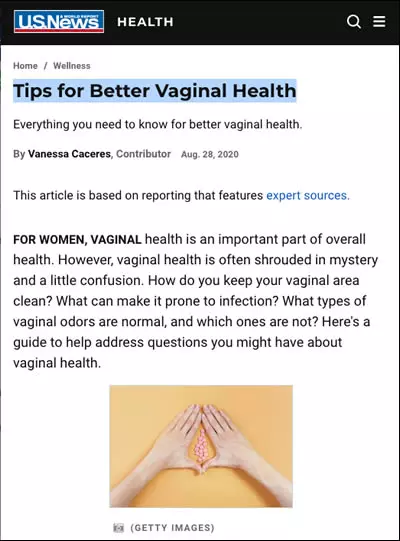US News and World Report reaches out to Heather Jeffcoat for an article entitled "Tips for Better Vaginal Health"
Here is an excerpt from this thorough and very informative article by Vanessa Caceres:
For women, vaginal health is an important part of overall health. However, vaginal health is often shrouded in mystery and a little confusion. How do you keep your vaginal area clean? What can make it prone to infection? What types of vaginal odors are normal, and which ones are not? Here's a guide to help address questions you might have about vaginal health.
Basics About a Women's Genital Organs
Many people use the word vagina to describe what are actually several different body parts:
- The outside genital organs are the vulva. The parts of the vulva include the mons pubis, labia majora/minora and the clitoris. The clitoris is an area with sensitive tissue that's associated with sexual arousal.
- The opening from where you urinate is called the urethra. It's directly above the vaginal opening and below the clitoris.
- The vagina itself is actually inside your body. It's a tube that connects the external genital organs with the internal genital organs, which include the cervix and uterus.
- The vagina is lubricated by what are called the Bartholin glands.
- The cervix is the entrance to the uterus that opens when you give birth.
- The uterus is what carries a baby. When you have your period, your body sheds a lining from the uterus called the endometrium.
A healthy vagina has a balance of good bacteria and low pH. A pH level indicates how acidic or alkaline something is. The vagina is usually acidic. If the pH is too high, it can make you more vulnerable to vaginal infections.
Importance of Vaginal Health
Vaginal health plays a key role in overall health for a few reasons:
- Sexual problems and vaginal health problems that recur can have an impact on your self-esteem and affect relationships, says Dr. Gil Weiss, a partner at Association for Women's Healthcare and an assistant professor of clinical medicine in the Department of Obstetrics and Gynecology at Northwestern Memorial Hospital, both in Chicago.
- Recurring problems, such as a yeast infection or bacterial vaginosis, can lead to chronic pain in the vaginal area, says Heather Jeffcoat, a pelvic floor physical therapist, owner of Femina Physical Therapy in Los Angeles and author of "Sex Without Pain: A Self Treatment Guide to the Sex Life You Deserve."
- Certain vaginal problems can be signs of other whole-body health problems. For instance, if the labia or the clitoris are becoming smaller, these can be signs of hormone deficiencies, Jeffcoat says.
- Maintaining good vaginal health is also important for keeping sperm alive if you're trying to get pregnant.
The full article can be found here.

